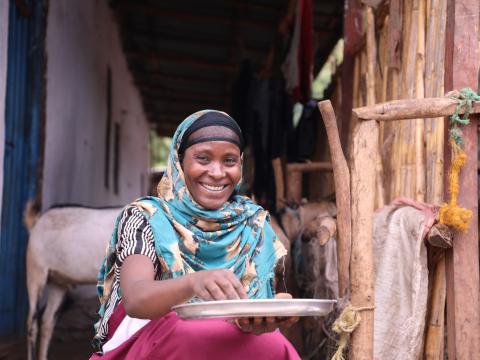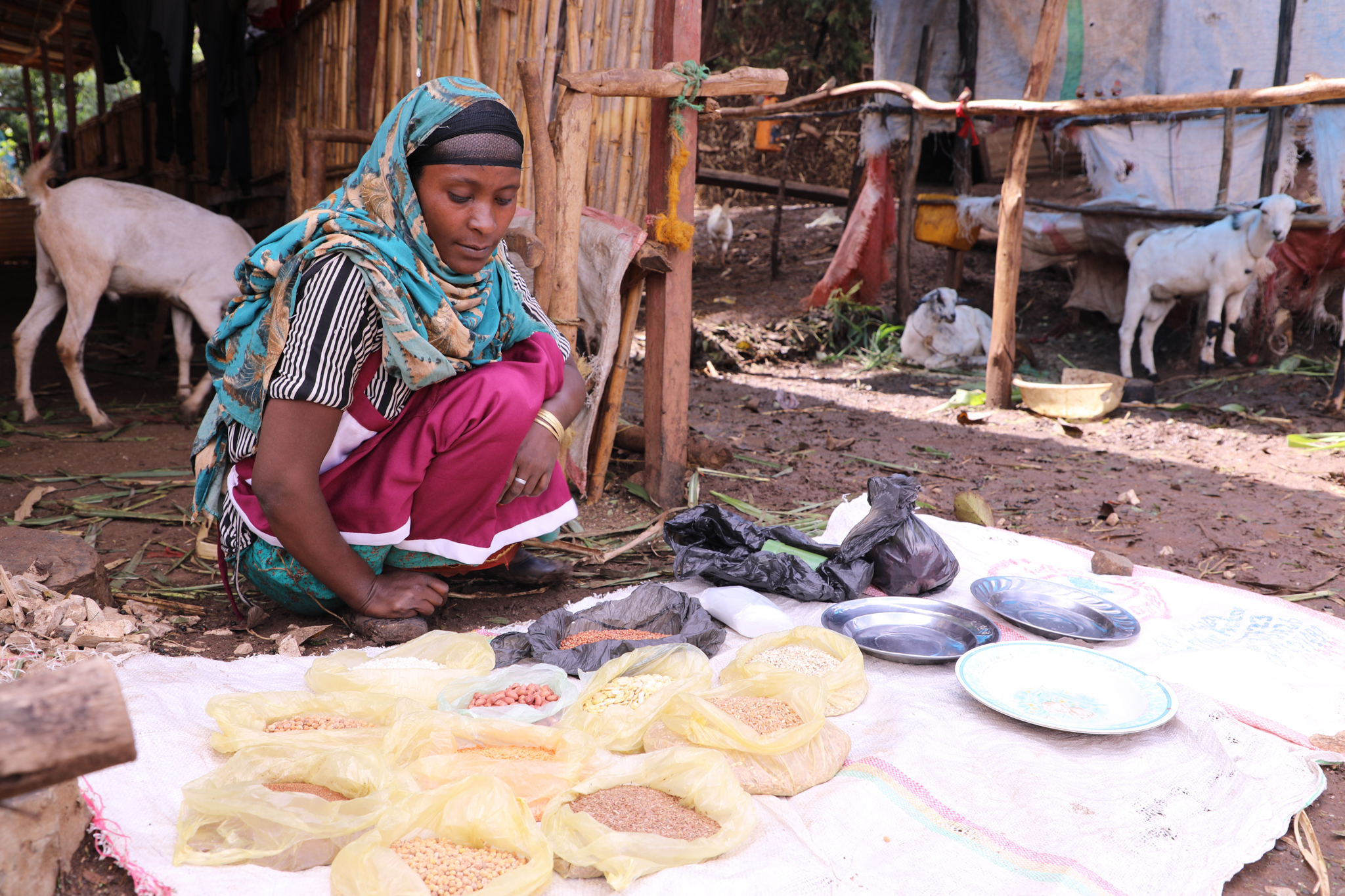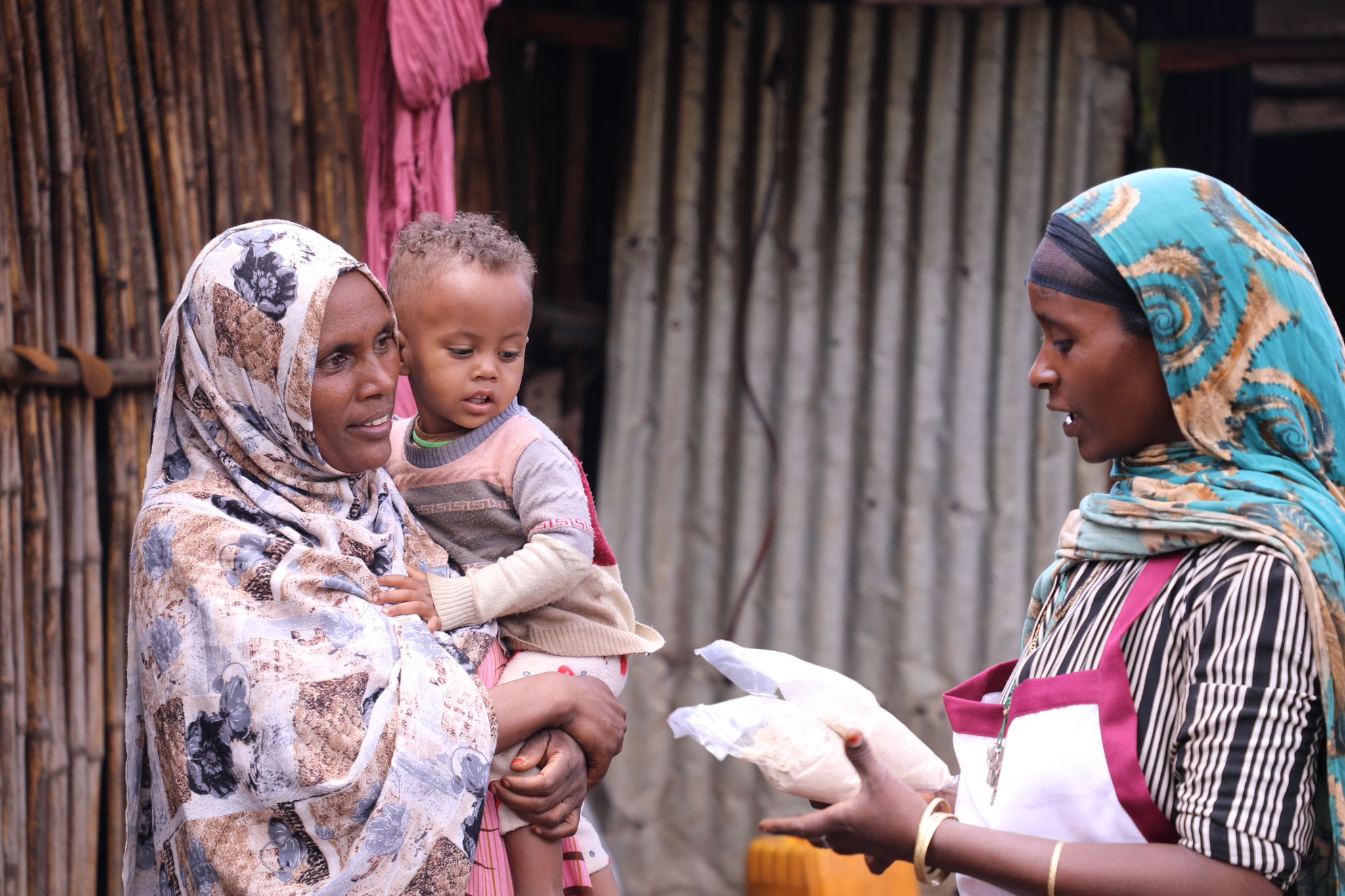Mixed flour helps combat malnutrition among children in the Oromia and Amhara regions of Ethiopia

Imagine yourself as a mother and see your daughter suffering due to malnutrition. The worst kind of feeling to see her getting weaker by the day, not knowing what to do to help her.
Sadia is a dedicated mother who resides in the hamlet of Kurfa village, Ethiopia. A rural woman who did not get much of a formal education, she was not aware of the proper way to keep her children healthy with food ingredients that were already available all around her. She became one of the Strengthen Productive Safety Net Programme (PSNP) Institutions and Resilience (SPIR II) programme participants when her daughter was diagnosed with malnutrition. "I began preparing this mixed flour when my daughter suffered from malnutrition," Sadia recalls. "SPIR II provided us with training on producing mixed flour, enabling us to nourish our children with a balanced diet and sell the surplus for income generation."
World Vision with partners, working together through the SPIR II Project, has carried out formative research on barriers to timely complementary feeding for six-month-old children in the Oromia region of Ethiopia. The main difficulties highlighted were the high cost of nutrient-dense meals and the widespread consumption of harmful processed foods.
In response to this challenge, SPIR II has trained mothers on how to prepare and sell nutrient-rich flour through door-to-door marketing while ensuring its quality and safety.
 Having access to the mixed flour, which is prepared by blending milled legumes, grains, and sesame seeds into an easy-to-use flour, allows moms to prepare nutritious porridge for their children. This strategy has also created a sales force, encouraged long-term growth, and provided moms in target areas with a healthy flour supply that they can purchase.
Having access to the mixed flour, which is prepared by blending milled legumes, grains, and sesame seeds into an easy-to-use flour, allows moms to prepare nutritious porridge for their children. This strategy has also created a sales force, encouraged long-term growth, and provided moms in target areas with a healthy flour supply that they can purchase.
Mothers like Sadia who were trained have seen improvements in their lives since they began to produce and sell mixed flour. Sadia now provides nutritious food for her child while also making money by selling the surplus to her neighbours. Her increased financial security is clear, allowing her to purchase three goats, which she is actively fattening.
Marima Abason, who also lives in the same village as Sadia, is a mother of three. She is one of Sadia's customers who has benefitted from the nutritious mixed flour that Sadia mixes and sells.
“When I brought my child to the health centre for a check-up, the health extension worker told me he was malnourished. She recommended mixed flour, which I bought from Sadia. I enrich it with vegetables like carrots and beetroot, as well as milk, and feed it to him consistently. Two months later, I took my child to the health centre and discovered a significant change in his weight," Marima adds.
 Marima underlines the several advantages of blended flour. It saves her time, is simple to use, and is readily available. It is reasonably priced, and she has observed the impact on her child's health. The mixed flour has become an important part of her child's diet, providing key nutrients that have greatly benefited his health.
Marima underlines the several advantages of blended flour. It saves her time, is simple to use, and is readily available. It is reasonably priced, and she has observed the impact on her child's health. The mixed flour has become an important part of her child's diet, providing key nutrients that have greatly benefited his health.
Sadia's path as a retailer has not been without obstacles. However, due to high inflation, the prices of the ingredients she needs to produce the flour, such as cereals and legumes, continue to rise. Moreover, it is difficult for her to find high-quality foods, particularly in the remote area where she lives. Despite these obstacles, Sadia's commitment is unshakeable. "Given our awareness of the advantages of the mixed flour for children, we will remain committed to its production and door-to-door sales," Sadia envisions.
The stories of Sadia and Marima highlight the profound impact and synergies that locally produced, nutritious food can have on the community. Through skill training and determination, Sadia has not only improved her family's well-being and brought economic stability, but she has also contributed to introducing nutritious food to her village community.
The SPIR II initiative is critical in supporting World Vision International's ENOUGH campaign, launched this year to combat child hunger and malnutrition in Africa, including Ethiopia. The campaign specifically targets reducing malnutrition, especially among children under five.
By Emnet Dereje, Communications Specialist (SPIR II), World Vision Ethiopia
About SPIR II
Strengthen Productive Safety Net Programme (PSNP) Institutions and Resilience (SPIR) II is a five-year Resilience Food Security Activity (RFSA) implemented by a consortium of partners led by World Vision that includes CARE, ORDA, and learning partner IFPRI. It is powered by funding from the USAID Bureau for Humanitarian Assistance (BHA), which focuses on enhancing livelihoods and resilience to shocks and improving food security and nutrition for rural households in Ethiopia’s Amhara, Oromia, and Tigray regions through interventions aligned with the government’s Productive Safety Net Programme (PSNP).
Acknowledgement
This publication was produced in collaboration with World Vision under the SPIR II Program, Cooperative Agreement Number 720BHA21CA00036, funded by the U.S. Agency for International Development.
Disclaimer
This media product is made possible by the generous support of the American people through the United States Agency for International Development (USAID). The contents are the responsibility of World Vision and do not necessarily reflect the views of USAID or the United States Government.